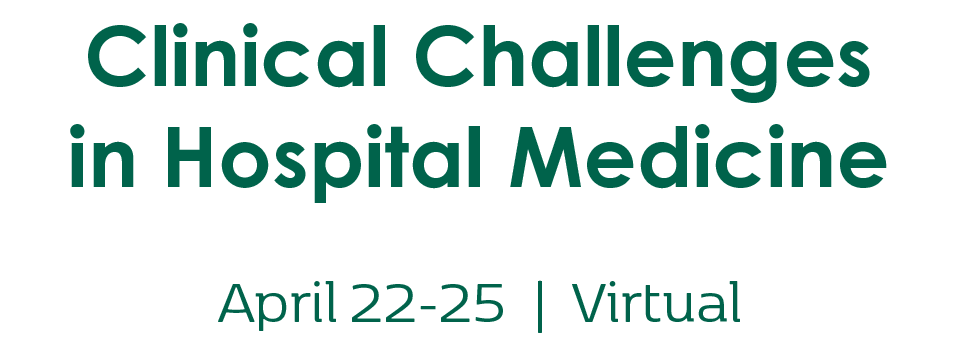
Agenda/View Sessions - April 24, 2025
8:00 am EDT
Hyponatremia (2025)
Overview
Learning Objectives:
- Define Hyponatremia and Understand Its Clinical Significance Explain the definition of hyponatremia, typically characterized by a serum sodium concentration below 135 mmol/L. Discuss the potential clinical consequences of hyponatremia, including neurological symptoms such as confusion, seizures, and coma.
- Classify the Different Types of Hyponatremia Based on Volume Status Differentiate between hypovolemic, euvolemic, and hypervolemic hyponatremia. Identify common causes for each type: Hypovolemic Hyponatremia: Caused by conditions such as diarrhea, vomiting, diuretic use, and excessive sweating. Euvolemic Hyponatremia: Often associated with the Syndrome of Inappropriate Antidiuretic Hormone Secretion (SIADH), which can result from factors like certain medications or central nervous system disorders. WIKIPEDIA Hypervolemic Hyponatremia: Seen in conditions like heart failure, liver cirrhosis, and kidney failure.
- Recognize the Clinical Presentation and Symptoms of Hyponatremia Identify symptoms ranging from mild (e.g., nausea, headache) to severe (e.g., seizures, decreased consciousness). Discuss how the rate of sodium decline influences symptom severity. Develop Diagnostic Approaches for Hyponatremia Interpret laboratory findings, including serum osmolality, urine osmolality, and urine sodium concentration. Utilize clinical assessments to determine the patient's volume status.
Speaker(s)
Anis Rauf, DO, Physician, NANI
8:55 am EDT
Acute Kidney Injury in Hospitalized Patients (2025)
Overview
Learning Objectives:
- Define AKI and Its Diagnostic Criteria Describe the KDIGO (Kidney Disease: Improving Global Outcomes) criteria for diagnosing AKI. Differentiate between AKI and chronic kidney disease (CKD).
- Identify Common Causes, Types, and Risk Factors of AKI in Hospitalized Patients Discuss the three major types of AKI: prerenal (e.g., hypovolemia, heart failure), intrinsic (e.g., acute tubular necrosis, glomerulonephritis), and postrenal (e.g., obstructive uropathy). Recognize patient populations at higher risk for AKI.
- Recognize the Clinical Presentation and Laboratory Findings of AKI Interpret common laboratory markers, including creatinine trends and urine output. Identify key urinalysis and imaging findings that aid in differentiating prerenal, intrinsic, and postrenal AKI.
Speaker(s)
Anis Rauf, DO, Physician, NANI
9:50 am EDT
Chronic Kidney Disease: What Every Internists Needs to Know (HM 2025)
Overview
Learning Objectives:
- Discuss the common causes and neuroendocrine adaptations in a patient with chronic kidney disease
- List the systemic effects of chronic kidney disease
- Explain treatments of common complication of chronic kidney disease
Speaker(s)
Mark D. Baldwin, DO, MACOI, FASN (he/him/his), Professor and Chair, Department of Primary Care Medicine, Arkansas Colleges of Health Education, College of Osteopathic Medicine
10:25 am EDT
Self-care, Wellbeing, and Self-Help for the Practicing Hospitalist (2025)
Overview
Learning Objectives:
- Understand the Importance of Self-Care for Hospitalists Participants will be able to define self-care, wellbeing, and self-help and recognize their significance in maintaining personal and professional resilience in a high-stress hospital environment.
- Identify the Unique Challenges Faced by Hospitalists Participants will be able to identify common challenges hospitalists face, such as burnout, long working hours, emotional toll, and administrative burdens, and understand how these impact both their wellbeing and patient care.
- Develop Practical Strategies for Enhancing Wellbeing Participants will be able to create a personalized self-care plan, utilizing practical strategies such as time management tools, mindfulness techniques, and seeking organizational support to improve their work-life balance and reduce burnout.
Speaker(s)
Nicholas J. Caputo, DO, FACOI (he/him/his), Department of Clinical Science, A.T. Still University School of Osteopathic Medicine
11:15 am EDT
Managing Patients with Sleep Apnea in a Hospital Setting (2025)
Overview
Learning Objectives:
- Discuss normal sleep and the effect on healing in hospitalized patients
- Discuss screening measures to identify patients with sleep apnea
- Discuss treatment objectives for sleep apnea in hospitalized patient
Speaker(s)
Michelle F. Zetoony-Nudell, DO, FACOI, Clinician and Owner, DO Sleep Solutions, Inc
12:05 pm EDT
Sepsis Admission (2025)
Overview
Learning Objectives:
- Discuss the current sepsis definition and briefly discuss the history leading us to current standards.
- Discuss the current Surviving Sepsis Campaign guidelines and CMS Sepsis Core Measure (SEP-1).
- Discuss commons areas of “Fall Out” when treating sepsis and ways to improve.
Speaker(s)
Orhay Mirzapolos, DO (she/her/hers), Emergency Medicine Physician, Midwestern University/Rush Copley Medical Center
12:35 pm EDT
What the HeF, is it pEF? Challenges in Diagnosis and Treatment of Diastolic Heart Failure (2025)
Overview
Learning Objectives:
- Identify the pathophysiology behind the mechanism of HFpEF
- Improve diagnostic accuracy and understand interrelationship with medical comorbidities
- Summarize and apply evidence backed treatment strategies
Speaker(s)
Marcel Letourneau, DO (he/him/his), Interventional Cardiology, Corewell Health West
1:25 pm EDT
Afib (2025)
Overview
Learning Objectives:
- Identify and Implement Updated Risk Stratification – Describe the latest recommendations for stroke risk assessment and anticoagulation therapy, including changes to the CHA₂DS₂-VASc scoring system.
- Optimize Rate and Rhythm Control Strategies – Compare and apply guideline-directed medical and procedural management options, including antiarrhythmic medications, catheter ablation, and emerging therapies.
- Integrate Lifestyle and Comorbidity Management – Explain the role of weight management, blood pressure control, and treatment of obstructive sleep apnea in improving atrial fibrillation outcomes.
Speaker(s)
Chad A. Link, DO, FACC, FACOI, Cardiologist, University of Michigan Health- Sparrow
2:15 pm EDT
Acute Psychotic Behavior/Hospital Delirium (2025)
Overview
Learning Objectives:
- To list causes of acute psychosis
- To understand the role of prescribing cascades in acute confusion
- To describe best options for management of acute behavioral issues associated with delirium
Speaker(s)
Stephen Scheinthal, DO, Professor and Chair, Rowan-Virtua School of Osteopathic Medicine
| Access Date | Quiz Result | Score | Actions |
|---|



